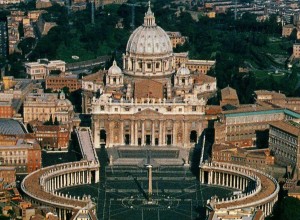 The Vatican accused a UN committee of intolerance against Christians and interfering with the free exercise of religion in a scathing reply to a UN committee released to the press last Friday.
The Vatican accused a UN committee of intolerance against Christians and interfering with the free exercise of religion in a scathing reply to a UN committee released to the press last Friday.
The Vatican’s official response to explosive comments made by the UN Committee on the Rights of the Child earlier this year, which told the Catholic Church to change its teaching on abortion and same-sex attraction, departs sharply from UN etiquette by confronting the committee bluntly and without mincing words.
The Vatican is especially harsh on the committee for meddling with religious freedom, as well as sowing confusion and disregard of international law. It chastised the UN committee for abusing its position to disparage the Catholic Church during the reporting process under Convention on the Rights of the Child.
The committee’s recommendation to change Church teaching on abortion was “completely unacceptable,” the Vatican said. The treaty states that children must be protected “before and after birth.” With regards to Church teaching about marriage, the Vatican said same sex couples, sexual orientation, and diverse forms of the family are “controversial” and “subjective lifestyle choices” never contemplated by human rights treaties.
According to the Vatican the UN experts are guilty of “negative stereotyping” and “intolerance against members of the Catholic religion.” The committee “launched” into interpretations of scripture, as well as observations on faith, morals, and canon law.
The Vatican said the committee applied the principle of non-discrimination in an “unprincipled way, namely as a sword against freedom of religion” when it claimed Church teaching on the complementarity and equal dignity of man and woman are examples of sexism.
Sexual education is outside the purview of the treaty, noted the Vatican “Education about authentic human love, human sexuality, married love and related matters are primarily and fundamentally the right, duty, and responsibility of parents.”
Aside from the substance of the recommendations, the committee failed to comprehend the “specific nature and mission” of the Holy See. The committee told the Vatican it was responsible for the actions of clerics and Catholic institutions operating in the territory and under the laws of other countries.
“The Holy See’s religious and moral mission, which transcends geographical boundaries, cannot be transformed into a sort of universal legal jurisdiction, which somehow becomes a matter under the mandate of a treaty body,” the Vatican explained. That would require the Church to “control the daily activities of clerics, religious and laypersons, living in the territories of sovereign States.”
Vatican Press spokesperson Fr. Federico Lombardi had promised a detailed response following the committee’s observations earlier this year. He explained that outside the borders of the Vatican City all the Church could do was support the treaty with its moral and spiritual clout. The Vatican became the fourth party to the treaty in 1990 under John Paul II and the treaty enjoys near universal ratification by UN member states.
Other UN state parties to the treaty will follow the Holy See with interest. It remains to be seen if the committee includes the Holy See’s reply in the official record of the reporting process that is reviewed annually by the UN General Assembly. The committee may try to limit the exposure of the Vatican’s response within the UN system.



